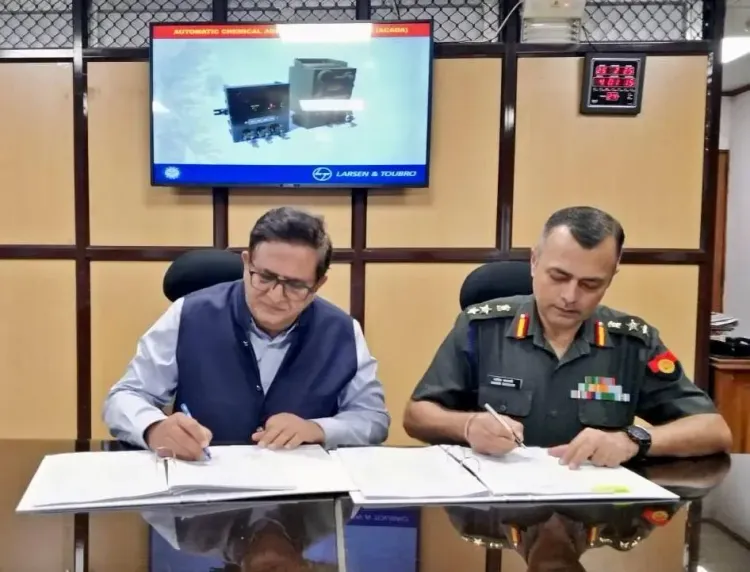L&T Secures ₹80 Crore Contract for Essential Army Gear in Support of 'Atamnirbharta'

Synopsis
Key Takeaways
- Contract valued at ₹80.43 crore for 223 ACADA systems.
- Over 80% components sourced locally.
- Developed by DRDO’s Defence Research and Development Establishment.
- Enhances Indian Army’s CBRN capabilities.
- Significant for disaster response and peacetime operations.
New Delhi, Feb 26 (NationPress) The Indian Army has finalized a deal for the acquisition of 223 Automatic Chemical Agent Detection and Alarm (ACADA) systems from L&T Ltd at a value of ₹80.43 crore, categorized under the "Buy Indian" initiative, as per a statement released by the Defence Ministry on Wednesday.
This procurement will significantly augment the government's Atamnirbharta campaign since over 80 percent of the components and sub-systems will be sourced domestically, the statement indicated.
The ACADA systems have been designed and developed by the Defence Research and Development Organisation (DRDO) at its Defence Research and Development Establishment in Gwalior, representing a critical advancement in the country's indigenization efforts within the specialized CBRN (Chemical, Biological, Radiological, and Nuclear) sector.
The ACADA system is engineered to identify chemical warfare agents (CWA) and hazardous industrial chemicals (TICs) by analyzing air samples from the surroundings. It operates on the principle of Ion Mobility Spectrometry (IMS) and is equipped with two highly sensitive IMS cells for ongoing detection and simultaneous monitoring of toxic agents. The introduction of ACADA in field units will considerably bolster the Indian Army’s defensive capabilities against CBRN threats during both operations and peacetime, particularly in disaster relief scenarios linked to industrial emergencies, the statement noted.
In the context of the Indian defence landscape, CBRN pertains to safeguarding against threats posed by weapons or agents utilizing chemical, biological, radiological, or nuclear materials, alongside implementing defensive strategies to counter such risks. This domain involves the creation and deployment of detection, protection, and decontamination systems aimed at mitigating these threats.
India recognizes the possible CBRN attack risks from both state and non-state actors, rendering this area a vital focus for the military.
The Defence Research and Development Organisation (DRDO) is pivotal in advancing CBRN defense technologies, including detection systems, protective equipment, and decontamination solutions.
Moreover, the Indian armed forces engage in extensive training programs to ensure personnel are well-prepared to handle CBRN incidents.









